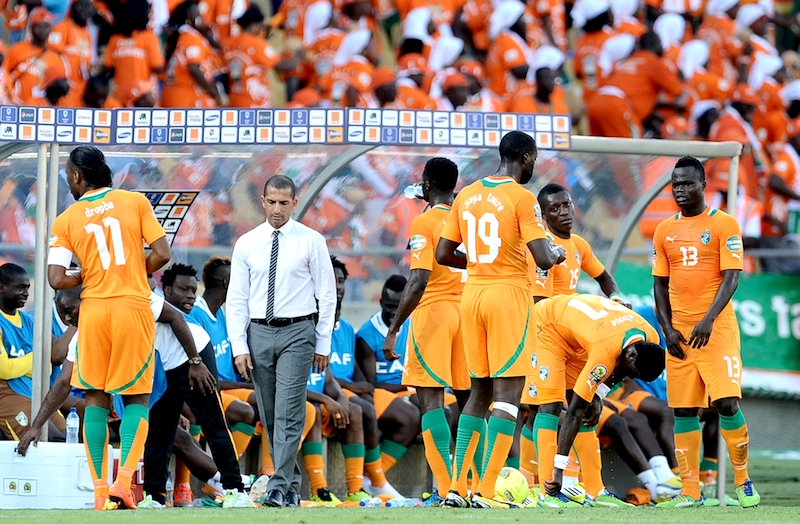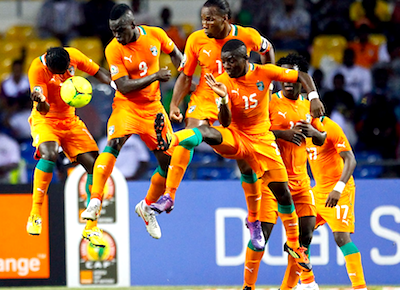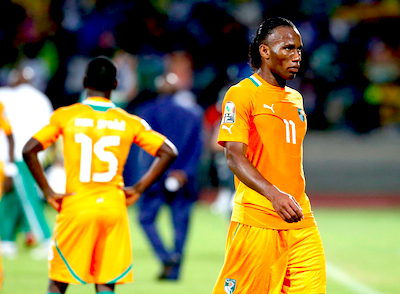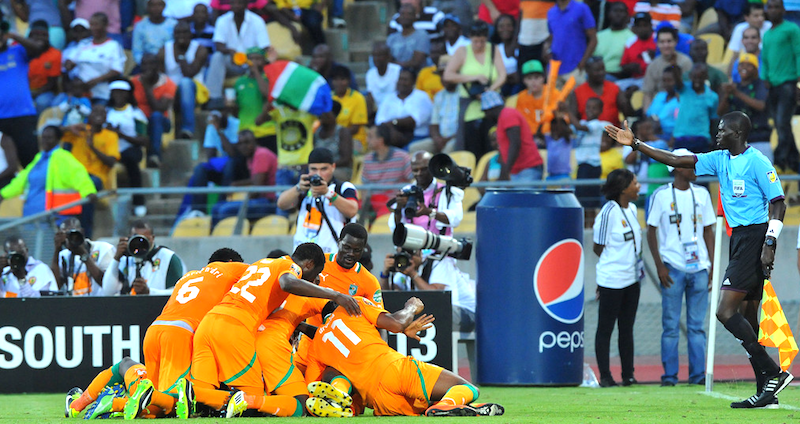Is time up for the Ivory Coast’s Golden Generation?
Is time up for the Ivory Coast’s Golden Generation?

Is time up for the Ivory Coast’s Golden Generation?
By Peter Sharland
In England, there is a general acceptance that we recently experienced a golden generation of talented footballers that never produced on the world stage. For whatever reason a team full of international superstars could never quite cut it at the World Cup and European Championships. However, when it comes to underperforming stars England has one consistent sympathiser, the Ivory Coast.
Blessed with some of Africa’s greatest players it really is no surprise that FIFA ranks the Ivory Coast as the strongest African nation in the world right now. This is despite not having won the African Cup of Nations since 1992 and not progressing past the group stage in the World Cup in either 2006 or 2010. You can point to both World Cups as being extremely unfortunate having been drawn into extremely tricky groups each time around, facing Argentina and Holland in 2006 and then Brazil and Portugal in 2010. But nevertheless this generation will go down as one that has failed to dominate the African scene in a way which was certainly possible.
The problems started in 2006 when The Elephants, who had failed to qualify for the previous tournament, entered this competition in a buoyant mood. However in perhaps what was a sign of things to come, they came unstuck by Egypt in the group stages and could only achieve a second place finish in their group. They did, however manage to rally but when they reached the final it was the aforementioned Egypt that they came up against. Despite the talent in their side the Ivory Coast couldn’t find a way through and they buckled under the pressure of penalty kicks. Two years later they were back with arguably a stronger side but just like before the Egyptians were too good for them. The defending champions were impervious on their way to a 4-1 win and it was another year of failure for the Ivory Coast. In 2010 it was Algeria who held their own against the overwhelming favourites. Despite what looked like a late winner from Kader Keita in the quarter finals Algeria rallied with Madjid Bougherra equalising in stoppage time before pinching a winner in extra time through Hameur Bouazza and sending the Ivory Coast home trophyless again. Then last summer we had one of the most famous upsets in Afcon history as lowly Zambia stunned the Ivory Coast in the final on penalties. With the tournament not being held again until 2015 this year’s competition really looked like last chance saloon for Drogba and co but alas it was not be yet again as the glamour of the Ivory Coast was undone in the quarter finals by the local players and industry of eventual winners Nigeria.
That’s five tournaments and to come away from each and every one of them with nothing is just not good enough especially for a squad that is as talented as this. Since the Samuel Eto’o hat trick of African Player of the Year awards (2002-2005) the Ivory Coast have had four winners and only failed to have a representative in the top three once. Last year they managed to secure the top two as their two finest players competed for the ultimate title in Africa. Yaya Touré and Didier Drogba are two of those who are not just amongst the finest players from the continent but indeed the world. The former has won titles with Barcelona and now Manchester City whilst the latter has spearheaded the Chelsea attack for almost a decade before leaving last summer. Alongside this their current squad can boast the likes of Kolo Touré and Didier Zokora each with over a hundred caps, the tireless Cheick Tioté and one of the most potent front lines in world football. Having just Drogba to rely on would be good enough for most countries in the world but the Ivory Coast can also call upon Salomon Kalou, Gervinho, Arouna Koné, Seydou Doumbia, Wilfried Bony and Lacina Traoré. An astonishing display of firepower with some of the most inform forwards in the world amongst their list. Whilst some players may be ridiculed it is worth noting that African defences are nowhere near the standard of those in Europe and this is perhaps where the Ivory Coast’s Achilles’ heel lies.
Take any position across the back five and you can be sure it will be one of the weakest if not the weakest position in the majority of African teams. It is just the way that football is played there. More midfielders and strikers are produced and why wouldn’t there be when you look at the recent African heroes. The likes of Drogba, Touré, Eto’o and even further back the likes of George Weah, Abedi Pele and Roger Milla. The lack of infrastructure also prevents real focus on training that European establishments can provide and goalkeeper and defence seem to the the positions that suffer in Africa. For the Ivory Coast things are no different and perhaps one of the greatest sources of frustration over recent years has been the goalkeeper Boubacar Barry, commonly known as Copa in Europe. Occasionally brilliant but often erratic Barry has constantly been a cut below the standards set by the rest of the team. In fact Egyptian striker Mido tweeted that Barry has gifted three African Cup of Nations to Egypt and whilst this seems harsh there is a sad sting of reality in it. Inconsolable following defeat to Nigeria it is hard not to feel sorry for Barry as he has remained virtually unchallenged for over six years. It is incredible to think that the Ivory Coast have failed to produce a keeper who could not even compete with their present number one but if teams have identified Barry as the national side’s weak point they aren’t exactly ignoring the rest of their team.
Nigeria lined up in such a way that they virtually shut down the Ivory Coast’s midfield and isolated their forward players, suffocating them and not allowing them to dictate play as they would like. Teams have worked out how to stop the Elephants playing and whilst some teams will find it difficult to implement the stronger nations have certainly managed it.
After their recent 3-0 victory over Gambia coach Sabri Lamouchi says he is delighted just to record a win so people can try and move on from the disappointment of the African Cup of Nations. In all honesty he must be delighted just to still be in a job. Granted he’s raised the performances of one or two individuals, Gervinho especially, but it just seems like the same old same old for the Ivory Coast team. With the expectation that surrounds each tournament comes the pressures as one of Africa’s strongest nations and with that comes the scars and memories of previous failures. This generation has been blighted by failure and after failure and their fragility is very real and is something that won’t go away quickly.
Perhaps this is then what the Ivory Coast now need, time. After all it is the greatest healer and with the World Cup in Brazil next summer expectations might be shifted onto Ghana or new champions Nigeria. With less expectation from those at home, especially given the finals are in a different continent the team’s older guard can pass the baton over smoothly and rather than being a team blessed with superstars the Ivory Coast can become one of the top squads in Africa rather than the standout squad. The loss of expectation could be the defining moment in this country’s footballing history.
This piece was written by Peter Sharland, who follows the game from a global perspective and contributes to Goal.com and Off The Post News. Comments below please.










